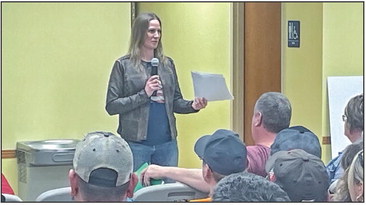Town still working on solar ordinance


By Kevin O’Brien
Town of Day residents on Tuesday directed their town board to work with Farmland First and the town attorney to come up with an ordinance restricting solar operations, and to have it ready for a vote by June 18.
Trine Spindler, a town resident and member of Farmland First, had been pushing the town to adopt an ordinance modeled after one in the town of Arpin in Wood County, but the conversation took a different direction after town chairman Joe Brueggen relayed concerns from the town’s attorney.
“I’m going to put in point-blank, he highly recommends: ‘Do not sign this ordinance,’” he said, referring to the one from Arpin.
Brueggen said the town attorney reviewed the 25-page document and wrote comments on 17 of the pages, raising concerns about its “inconsistency with state statute” and provisions being redundant or contradictory.
“I’m not saying that we shouldn’t have an ordinance, but maybe we shouldn’t have this ordinance,” Brueggen said.
After a lengthy discussion, town residents voted 54-3 to give local officials a couple more months to come up with a legally sound ordinance.
Town residents also voted 53-5 to approve a letter of support for the town of Eau Pleine in its legal battle against EDP Renewables, which is demanding that Eau Pleine rescind its wind siting ordinance.
A similar letter was originally drafted for the town of Brighton, which is also facing legal action by EDP, but Spindler withdrew that request after learning that Brighton made revisions to its ordinance based on the advice of its insurance company attorney.
Stacy Kundinger, an Arpin resident, spoke to town residents at an informal meeting last week about her experience helping to get her town’s ordinance adopted. Arpin formed a committee to develop the ordinance after the township first became aware of potential solar panel installations about a year ago.
“We did not have any idea of what we were dealing with until they were in our backyard,” she said.
Kundinger said the town of Saratoga, which has two large solar operations, already had an ordinance in place, but she said it’s “not very strong.” She said Arpin residents ended up using an ordinance from the town of Courtland, in Columbia County, as the template for their own ordinance, with elements from other town ordinances included.
Among Arpin’s concerns was the possible impact of stray voltage on cattle and people who are hypersensitive to electromagnetic energy, along with the potential for soil and water contamination, especially in the event of hailstorm or other severe weather, she said.
“What happens when these panels are damaged, with the contaminants in the panels now leaching into the soil or the groundwater?” she said.
Kundinger said Arpin residents also had questions about the effects of glare off the solar panels and the impact on wildlife habitat, due to potentially fencing off thousands of acres.
Concerns were also raised about responding to emergencies at solar facilities.
Stratford Fire Chief Tim Carey said he looked at Saratoga’s emergency action plan for handling solar panel fires, and it’s left up to local emergency responders to handle those situations.
“We’re not equipped, trained or prepared to do that,” he said.
Brian Ruesch, a land sales specialist at Whitetail Properties Real Estate, said his 50 years of experience tell him that having a solar farm next to your house or farm is going to have negative impact on the value, and the energy company is not going to pay anything for that loss.
“I believe it will impact your real estate values, but the problem is, it’s so new, how do we actually know what it’s going to do at this point in time?” he wondered. “But my gut feeling is – and I’ve been doing this a long time – is that it will have an impact, and I don’t think it will be a good one.”
Kundinger said the ordinance doesn’t prevent people from putting solar panels on their houses, and it can’t completely stop largescale operations from being built.
“The point of the ordinance is to protect those of use who are living within the community that are potentially going to be living with this,” she said.
The issue of solar energy production has been a divisive one for Arpin, she said.
“I’ve been there for 30 years and I have not seen it like this, neighbor against neighbor,” she said.
Brueggen said he spoke to a landowner in the township who has leased some of his land to a solar company, but the project is still in an investigative stage, which could last up to seven years.
“That landowner is still being paid whatever monies they’ve agreed upon, basically rent,” he said.
Before signing the lease, Brueggen said the landowner had the contract reviewed by an attorney, who made “some heavy demands of the solar company” that were included in the final draft. Some of the provisions included regular weed control, erosion prevention, “deer friendly” wire fencing, regular replacement of spent panels and restoration of the property to productive farmland after the solar operation ceases operation.
“Again, if you’re approached and you’re interested, go to your lawyer,” he advised town residents.
MAKING HER CASE - Trine Spindler speaks to fellow town of Day residents last week about passing an ordinance to regulate solar operations. STAFF PHOTO/KEVIN O’BRIEN
